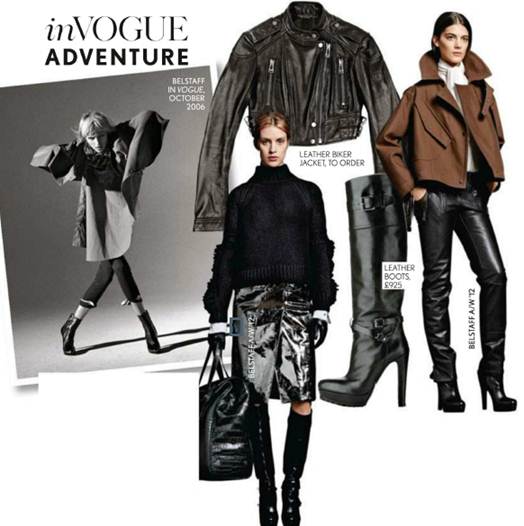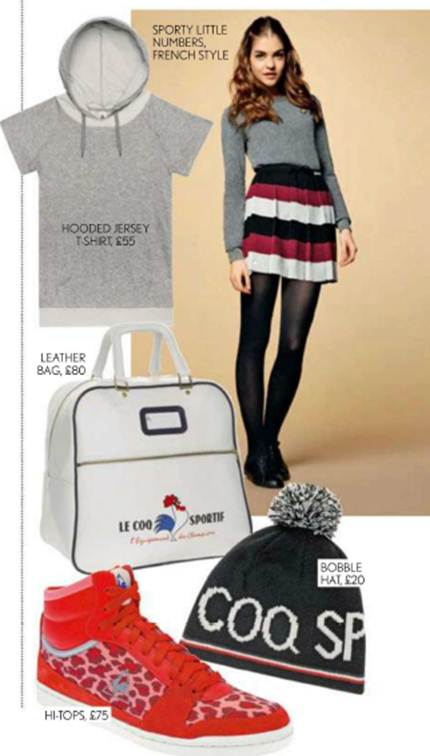Belstaff
A British company’s journey from the back
of motorbikes to the shoulders of the jet set In 1952, setting off for a
5,000-mile trip around South America on an ailing motorbike, a journey later
detailed in The Motorcycle Diaries, a 23-year-old Che Guevara packed light.
There was one essential piece of kit, through: his Belsraff Trial master. Having
been launched five years earlier, the boxy, belted jacket with multiple pockets
and quilted shoulders was already a firm favorite with discerning ad ventures.
Charged with keeping out the elements on the back of a bike, it brought some
style long for the ride. Sixty years later, the Trial master has a new
departure, through a relaunch of its brand.

Latest
fans include Victoria Beckham and Angelina Jolie
In June 2011, Belstaff was bought by
Labelux, the luxury group with visionary New York businessman Harry Slatkin as
CEO and Tommy Hilfiger as an advisor. This dream team was added to when Martin
Cooper, a fellow Yank who headed up Burberry’s outerwear in London for 16
years, was named chief creative officer.
Founded in 1924 by Harry Grosberg, Belstaff
has a rich history. The first brand to use waxed cottons for outerwear, it was
adopted by motor-cyclists, including Steve McQueen, and was soon more than a
concession to the weather. Its “phoenix rising” symbol became a badge on the
jackets of a glossy international elite (the Trial master’s latest fans include
Victoria Beckham and Angelina Jolie).
This season, Cooper handled the heritage
with a light, assured touch. At London Fashion Week, his debut collection
gently but firmly ushered in a new era. A fuzzy shearling military coat,
pulling together classic lines and a modern, playful take on texture, was the
first look. More outerwear that struck this balance followed. The Trial master
was central, but reworked in python. Other highlights included a mini-biker
with scaled-down epaulettes in army-green leather and, in a nod to the
motorcycle, tea dresses with dévoré-style effects that resembled oil slicks.
In addition to a new space at Harrods,
Belstaff stores are to open in London and New York by the Bond Street shop will
replicate a country house, re-imagined as a destination store, complete with
antique oddities to discover among the clothes. All in keeping with the brand’s
history, without straying towards nostalgia – it looks like Belstaff is on the
right road once again. Lauren Cochrane
Le Coq Sportif

Sporty
little numbers, French style
For 130 years, Le Coq sportif retained a
laissez-faire approach to sporting apparel with its simple, unfussy kit; images
of off-duty French tennis stars and attractive wives lounging in pastel
terry-towelling tracksuits dominated. That all changed in 2010 when the brand
returned to its Romilly-sur-Seine roots, transforming its historic factory on
the outskirts of Paris into a textile development centre. Now, past and future
work in harmony, with techno-advanced fabrics fused into classic styles –
breathable training tops and lightweight jersey jogging bottoms line up with
preppy cotton cardigans and natty tricolor polo shirts. Emile Camuset, a keen
gymnast and cyclist, founded Le Coq Sportif in 1882, when he began employing
local seamstresses to make team kit for his friends. By 1920, Camuset had
become the official supplier for France’s professional football, rugby,
basketball, and track and field events, not to mention a 40-year sponsorship of
the tour de France that began in 1951 – reinstated for this year’s tour in
celebration of the brand’s anniversary, with a specially updated rooster
(France’s national symbol) logo by Ron Arad. Vive Le Cop! TM-S